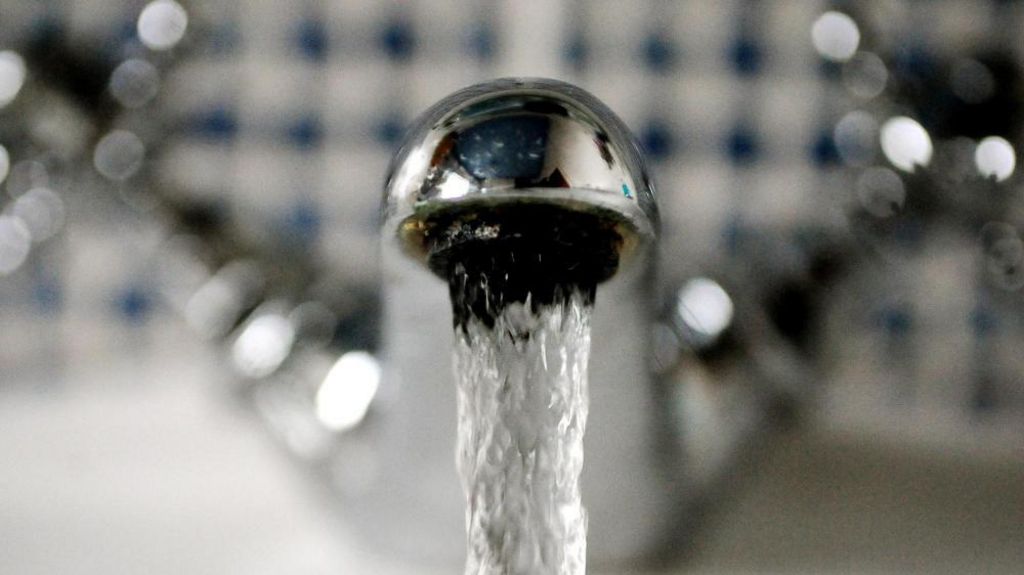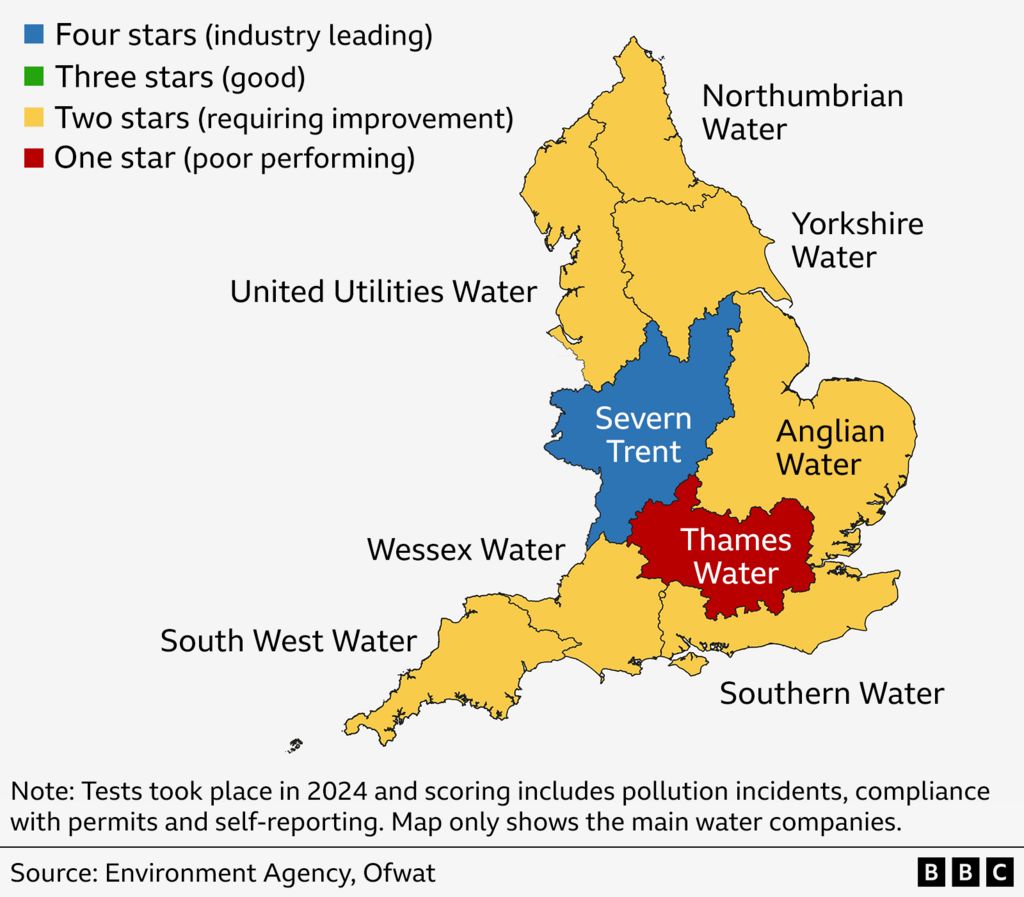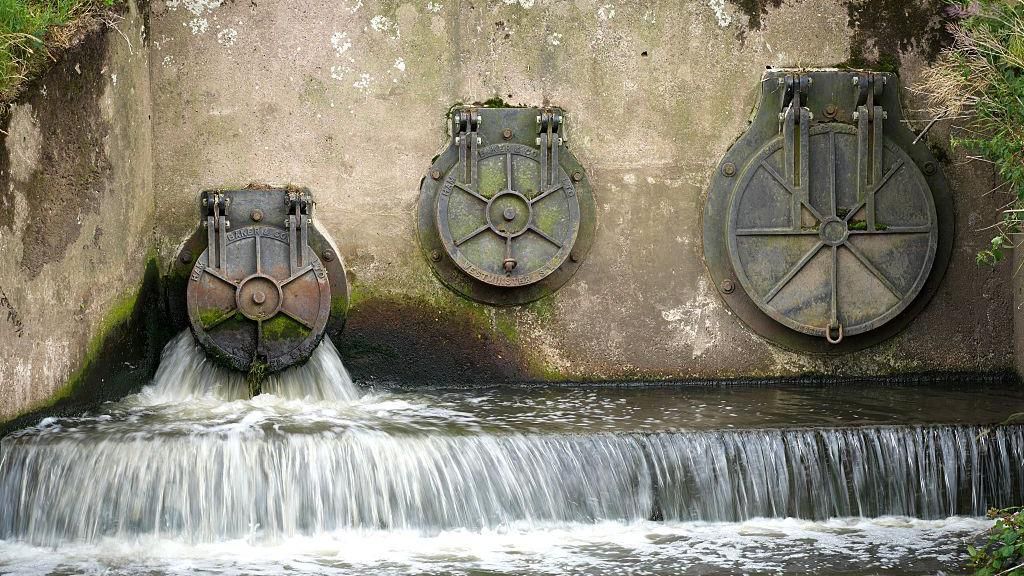Water companies told to refund £260m to customers for poor performance

England and Wales' water companies have been ordered to refund more than £260m to customers for poor performance.
The economic regulator Ofwat says 40% of that money has already been taken off this year's bills, with the rest to come off next year's. But bills are still due to rise steeply until 2030 to fund upgrades to the water system.
Earlier today, the Environment Agency (EA) gave England's water companies their worst ever combined marks in its annual rating system for their environmental performance in 2024, amid a spike in serious pollution incidents.
Industry body Water UK acknowledged that "the performance of some companies is not good enough" but pointed to investment since last year.
Thames Water – the UK's largest water company - has been penalised the most at £75.2m for its performance in the 2024/25 year.
It was also given the lowest, one-star rating by the EA.
A spokesperson for the company said: "Transforming Thames is a major programme of work that will take time; it will take at least a decade to achieve the scale of change required."
And Environment Secretary Emma Reynolds acknowledged: "We are facing a water system failure that has left our infrastructure crumbling and sewage spilling into our rivers.
"We are taking decisive action to fix it, including new powers to ban unfair bonuses, and swift financial penalties for environmental offences," she added.
Where companies fail to meet agreed targets on areas such as pollution and leaks, they are forced to make "underperformance" payments. Essentially that means customers get cheaper bills than they otherwise would have.
In the chart below, the size of these payments, in millions of pounds, are shown by the negative numbers on the left. All are given in 2017-18 prices.
Where companies exceed targets, they get "overperformance payments" and can charge customers more, shown by the positive numbers on the right. That only applied to United Utilities and Severn Trent Water.
But in spite of these underperformance payments, customers are experiencing significant rises to bills.
In April, they rose by an average of 26% in England and Wales, after Ofwat approved water company plans for billions of pounds of investment.
And they are due to rise further until at least 2030 to help upgrade water supplies and reducing the amount of sewage being spilled.
Ofwat described overall performance in 2024/25 as "mixed". It acknowledged progress in some areas like internal sewer flooding, where water from a sewer enters buildings.
But it said "there remain areas where companies and the sector must do more", including pollution and supply interruptions for some.
In its report, the Environment Agency (EA) gave England's main water and sewerage companies their worst ever combined score for environmental performance in 2024 since their ratings began in 2011.
In his foreword, the EA's chair, Alan Lovell, wrote: "Many companies tell us how focussed they are on environmental improvement. But the results are not visible in the data."
The EA's collective rating for the nine companies was 19 stars - down from 25 stars in 2023. No year had previously got fewer than 22 stars.
The EA says its assessment criteria has been tightened over time, so its ratings do "not mean performance has declined since 2011" and it had seen "some improvement" up to 2023.
But Mr Lovell said: "This year's results are poor and must serve as a clear and urgent signal for change."
The EA gave seven companies two stars - "requiring improvement" - and Thames one star. Only seven one-star ratings had ever been previously given.
And only Severn Trent got the top rating of four stars.
How does your water company rank for environmental performance?

It is the latest bad news for Thames Water, which has become mired in financial trouble. It reported a loss of £1.65bn for the year to March, while its debt pile climbed to £16.8bn.
"We know we need to further improve for our customers, communities and the environment, and that is why we have embarked on the largest ever investment programme, delivering the biggest upgrade to our network in 150 years," a Thames spokesperson said.
The EA reported in July that "serious" pollution incidents by water companies in England had increased by 60% in 2024 versus 2023.
It attributed last year's environmental performance to three factors – wet and stormy weather, long-standing underinvestment in infrastructure, and increased monitoring and inspection "bringing more failings to light".
In response to today's findings, James Wallace, chief executive of campaign group River Action UK, said: "Water companies in England and Wales are still underperforming, especially on serious pollution incidents, exposing the bankruptcy of the privatised water model.
"We urgently need a complete overhaul of this failed system to ensure that bill payers receive a fair service and that our rivers are properly protected from pollution."
From 2027, the EA will replace its current star ratings with a new system – a scale from one to five, from "failing" to "excellent".
The government argues this will give a more accurate reflection of performance, with companies not able to achieve the top rating unless they "achieve the highest standards across the board".

Earlier this year the government said that Ofwat would be scrapped and replaced by a single regulator.
That followed a landmark review of the "failing" water sector in England and Wales, which recommended stronger regulation to hold water companies to account. It warned that there would be no quick fixes to improve the state of our rivers or bring down bills.
In response to today's EA's report, Mike Keil, chief executive of the Consumer Council for Water, said: "Customers are now paying more than ever before through water bills and they will expect to see companies delivering on their promises to cut pollution and help bring rivers, lakes and wildlife habitats back to life.
"If the industry fails to deliver, the damage to public trust - which is already at an all-time low - may be unrecoverable," he added.
(Feed generated with FetchRSS)
